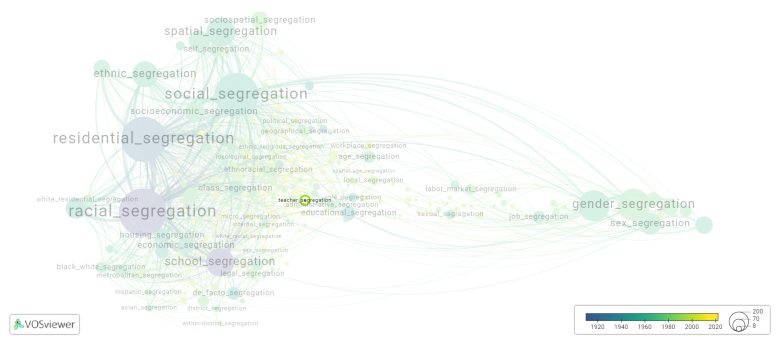Teacher segregation
Date and country of first publication[1][edit | edit source]
2005
United States
Definition[edit | edit source]
Teacher segregation refers to the practice of separating teachers based on race, ethnicity, or gender. It can occur in various ways, such as assigning teachers of different races or ethnicities to teach in different schools or classrooms, or providing different resources and support to teachers based on their race or gender.
Teacher segregation has its roots in historical patterns of racial and gender discrimination in the education system. For example, during the era of racial segregation in the United States, African American teachers were often relegated to teach in predominantly African American schools with fewer resources and opportunities for advancement. Similarly, women teachers were often confined to teaching certain subjects or grade levels, while male teachers were given preference for positions of leadership and higher salaries.
While overt forms of teacher segregation have largely been eliminated, there are still some disparities in teacher assignments and opportunities based on race, ethnicity, and gender. For example, research has shown that schools with high poverty rates or predominantly students of color are more likely to have lower-quality teachers and higher teacher turnover rates. Additionally, women teachers are still underrepresented in positions of leadership and administration in many school districts.
Efforts to address teacher segregation focus on promoting diversity and equity in the teaching profession. This includes initiatives to recruit and retain teachers from diverse racial and ethnic backgrounds, provide equal and fair opportunities for professional development and advancement, and ensure that all students have access to high-quality, well-supported teachers regardless of their race, ethnicity, or gender.
See also[edit | edit source]
Related segregation forms[edit | edit source]
Teacher segregation is frequently discussed in the literature with the following segregation forms:
This visualization is based on the study The Multidisciplinary Landscape of Segregation Research.
For the complete network of interrelated segregation forms, please refer to:
References[edit | edit source]
Notes[edit | edit source]
- ↑ Date and country of first publication as informed by the Scopus database (December 2023).
At its current state, this definition has been generated by a Large Language Model (LLM) so far without review by an independent researcher or a member of the curating team of segregation experts that keep the Segregation Wiki online. While we strive for accuracy, we cannot guarantee its reliability, completeness and timeliness. Please use this content with caution and verify information as needed. Also, feel free to improve on the definition as you see fit, including the use of references and other informational resources. We value your input in enhancing the quality and accuracy of the definitions of segregation forms collectively offered in the Segregation Wiki ©.
Teacher segregation appears in the following literature[edit | edit source]
Mitchell R.E., Mitchell D.E. (2005). Student segregation and achievement tracking in year round schools. Teachers College Record, 107(4), 529-562. Teachers College, Columbia University.https://doi.org/
Jankov P., Caref C. (2017). Segregation and inequality in Chicago public schools, transformed and intensified under corporate education reform; [Segregação e desigualdad nas Escuelas Públicas de Chicago, transformadas e intensificadas sob a reforma da educação corporativa]; [Segregación y desigualdad en las Escuelas Públicas de Chicago, transformadas e intensificadas bajo la reforma de la educación corporative]. Education Policy Analysis Archives, 25(), -. Arizona State University.https://doi.org/10.14507/epaa.25.2631

